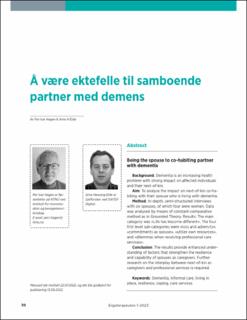| dc.contributor.author | Hagen, Per Ivar | |
| dc.contributor.author | Eide, Arne Henning | |
| dc.date.accessioned | 2023-10-25T13:36:14Z | |
| dc.date.available | 2023-10-25T13:36:14Z | |
| dc.date.created | 2023-03-02T08:57:12Z | |
| dc.date.issued | 2023 | |
| dc.identifier.citation | Ergoterapeuten. 2023, (1), 30-38. | en_US |
| dc.identifier.issn | 0800-3475 | |
| dc.identifier.uri | https://hdl.handle.net/11250/3098715 | |
| dc.description.abstract | Background: Dementia is an increasing health problem with strong impact on affected individuals and their next-of-kin.
Aim: To analyse the impact on next-of-kin co-ha biting with their spouse who is living with dementia.
Method: In-depth, semi-structured interviews with six spouses, of which four were women. Data was analysed by means of constant-comparative method as in Grounded Theory. Results: The main category was «Life has become different». The four first level sub-categories were «loss and adversity», «commitments as spouse», «utilize own resources», and «dilemmas when receiving professional care services».
Conclusion: The results provide enhanced under standing of factors that strengthen the resilience and capability of spouses as caregivers. Further research on the interplay between next-of-kin as caregivers and professional services is required. | en_US |
| dc.language.iso | mis | en_US |
| dc.relation.uri | https://www.ergoterapeuten.no/arkiv | |
| dc.title | Å være ektefelle til samboende partner med demens | en_US |
| dc.title.alternative | Å være ektefelle til samboende partner med demens | en_US |
| dc.type | Peer reviewed | en_US |
| dc.type | Journal article | en_US |
| dc.description.version | publishedVersion | en_US |
| dc.source.pagenumber | 30-38 | en_US |
| dc.source.journal | Ergoterapeuten | en_US |
| dc.source.issue | 1 | en_US |
| dc.identifier.cristin | 2130659 | |
| cristin.ispublished | true | |
| cristin.fulltext | original | |
| cristin.qualitycode | 1 | |
